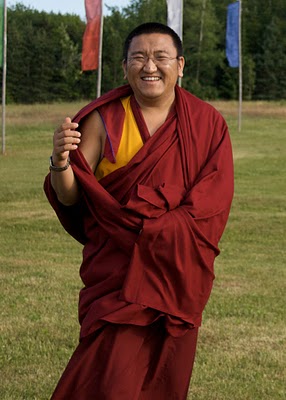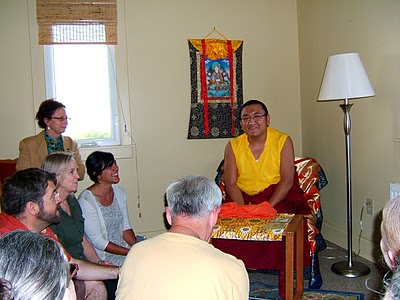Changling Rinpoche Offers Diamonds of Wisdom About Living at a Dharma Centre
Ven. Changling Rinpoche is from Shechen Monastery and is the holder of the ‘Northern Treasures’ lineage. Rinpoche holds a khenpo degree and teaches the senoir students at Sechen College and those in a traditional three-year retreat. Rinpoche protects the integrity of the ritual tradition of Sechen and teaches ritual and Nyingma tantra to senior students, and is dedicated to helping translate the Tibetan Buddhist teachings into English and other languages. When he taught at Dorje Denma Ling last year we were very honored to be granted a staff audience with him, where he gave us some diamonds of wisdom about living at a dharma centre. This is one excerpt, and we will post more later.
Ven. Changling Rinpoche: When we have a drupchen it’s for 10 days, and for 24 hours a day the practice goes on. On the last day, when the drupchen finishes, still the monks are very, very active. They’re not exhausted, they’re very, very active. If you come to the monastery you’ll see the monks are full of energy. What brings us all that strong energy is that we clearly understand what we are really doing there. When we know that, that is what brings all the energy, knowing clearly what we are doing. In the monastery monks are not doing work because they are being paid with a good salary; there is no salary in the monastery. So you have to work and face all the problems and complaints and everything, and there is nothing for you, it is all service for others. But we know why we are doing this. It is all related with the Buddhist principles. I won’t say that we don’t know the word “exhaustion,” but we hardly get something called “exhausted”; and when I look at why this is, the reason is that we know what we are doing, and for what we are doing it, so it doesn’t make us get exhausted or depressed, or want to give up. So being on staff means that when you face a problem, you become more active. So therefore when we are facing a problem we do not run away. The main thing is to recognize why you are doing it.
Some of my friends come to the monastery and see this, and what you can learn is monks don’t know what it is to be overwhelmed, they don’t know at all. We don’t call it exhaustion; we say, “I’m really tired.” [Laughter] In the monastery monks don’t know the meaning of being overwhelmed. “Overwhelmed” is a word that is seen when we have a strong clinging on self, a person who strongly thinks about ME. That idea gives us recognition of something called “overwhelmed.” That is what I find. If we can reduce something called ME, it is less overwhelmed. In a certain celebration in Sechen monastery we had over 10,000 people, but everybody was handled by only 35 monks for the three days. I think the one thing we understood was why that was happening and what was happening. When you understand that, it makes for joy. When you have joy, I guess that is how you handle it with only 35 monks for over 10,000 people.
When you come here as a volunteer you should not think you have come for a vacation—you must know that. When you know that you are not here for a vacation, it is much better. Sometimes we go and volunteer because we just need a break from what we are doing, but normally volunteering means to help, to serve and help another. When we want to volunteer we want to do more. When we come to help it is not that we are taking a break, we are coming here to help. When you are here to help, that means there is work. [Laughter] When you recognize that, then you are less tired.




